World Heritage in Japan 14
Iwami Ginzan Silver Mine
and its Cultural Landscape
Iwami Ginzan Silver Mine and its Cultural Landscape
(Culture, registered in 2007)
The remains of Iwami Ginzan Silver Mine is in Ota City, situated at the
center of Shimane Prefecture. There are 3 areas.
- Remains of silver mine and siliver-mine town.
- Iwami Ginzan Road
- Harbor and harbor town
In 16th century, the Age of Geographical Discovery, it is said that almost
one third of silver in the world was produced in Japan, and most of Japanese
silver was produced in Iwami Ginzan. The map made in Europe at that time
shows how big the influence of Iwami Ginzan because it is largely picked
up within Japan.
More than 600 remains still exist even now in the Iwami mountain area.
The characteristics of Iwami Ginzan is that they neither broke the mountain
nor but down the forest. It was very ecological way of mining just to dig
the narrow tunnel. It was valued as world heritage because this is the
industrial remain which coexisted with the natural environment.
Followings are the main sightseeing spots.
Okubo-mabu (Okubo tunnel)
It is the biggest tunnel in Iwami Ginzan It was named after the first magistrate
Okubo. It was developed from Edo era to Meiji era. The hight of the tunnel
is maximum 5m and the regend says that Magistrate Okubo entered the tunnel
on horseback with spear. It is completely dark in the tunnel unless you
have a flashlight. The real cutted walls, very deep hole which seems to
reach to the center of the earth the high ceiling of the hole are daunting.
To visit the Okubo-mabu, you have to join the tour.
Ryugenji-mabu (Ryugenji tunnel)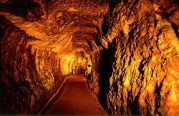
Ryugenji-mabu was developed in 1715 under the direct management of magistrate's office. It is 600m long and the second longest tunnel after Okubo-mabu.
You can enter the visiting area of 273m. You can see the wall cut by the
chisel. And the ancient documents of Iwami Picture Scroll is exhibited
on the way which shows the atomosphere of the ancient time.
Iwami Ginzan World Heritage Center
It was opend in 2008 to show the whole image of Iwami Ginzan to the visitors.
You can see how they produce the silver by the film and exhibition of artifacts
and pannels.
500 Rakans (500 luohan)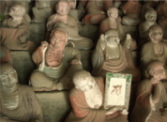
500 Rakans were completed in 1766 after 25 years of manufacturing to console
the ancestors who died in the silver mines started by the monk Gekkaijoin.
Rakanji Temple was built to protect these rakans.
If you cross the stone curved bridge, you can see three caves. Threre are
501 rakan sculptures in the caves of both ends.
Cityscape of Omori
Omori Town in Otashi was the center of Iwami Ginzan Territory. The inhabitants tried to maintain the atomosphere of the ancient time. Not only the Remains of Magistrate's Office and old temples and shrines, you can see the retrospect post office, bank, automatic vendors and so on.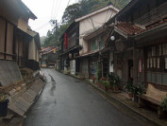
The house of Kumagaya Family was the old marchant house. It is designated
as Important Cultural Property. Kumagaya was one of the most influential
families and thier affairs were not only mining and sake brewing but also
examining the silver-tax, You can enjoy the ambience of ancient time by
visiting the accounting office, kitchen, things for the wedding, etc.
(Reference: Website of Sightseeing Navigation in Shimane)
How to access from Tokyo (example)
Tokyo Station-(Shinkansen)-Hiroshima Station-(bus)-Omori Daikanshoato
Total time: about 6.5 hours
* There is very few buses so please check the timetable beforehand.
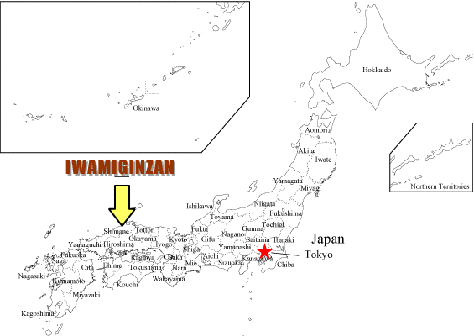
|
|
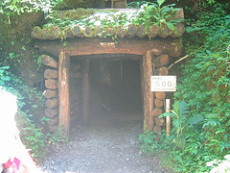
Entrance of Ryugenji-mabu
 Top page Top page
 General information of Japan General information of Japan
 World heritage in Japan World heritage in Japan
-Horyuji Temple
-Himeji Castle
-Yaku Island
-Shirakami Mountain Range
-Ancient Kyoto
-Shirakawa-go and Gokayama
-Hiroshima Peace Memorial
-Itsukushima Shrine
-Ancient Nara
-Shrines and Temples in Nikko
-Kingdom of Ryukyu
-Kii Mountain Range
-Shiretoko
-Iwami Silver Mine
-Ogasawara Islands
-Hiraizumi
-Mount Fuji
-Tomioka
-Site of Industrial Revolution
-Architectural Work of Le Corbusier
-Okinoshima & Munakata
 Accommodation in Japan Accommodation in Japan
 Japanese food Japanese food
 Japanese culture (National Treasures) Japanese culture (National Treasures)
 Japanese culture 2 (Culture in everyday life) Japanese culture 2 (Culture in everyday life)
 Japanese sports Japanese sports
 Japanese religion Japanese religion
 Souvenir of Japan Souvenir of Japan
 continually updated ! continually updated !
 Travel Diary in Tokyo Travel Diary in Tokyo
 My profile My profile
 Link Link
 English Guiding Service English Guiding Service
 info@ltij.net
info@ltij.net
|


